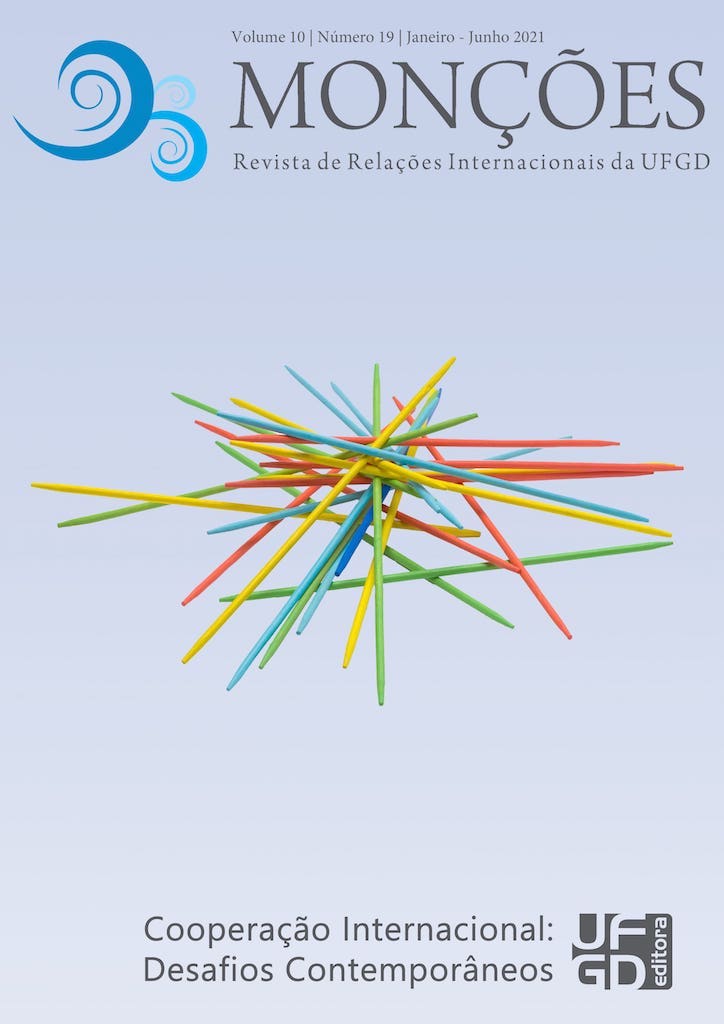International Cooperation for Development and Public Policies: a battlefiled for the authority of the international development concept
DOI:
https://doi.org/10.30612/rmufgd.v10i19.14551Keywords:
Cooperation for International Development, Political field, Public Policy.Abstract
The central argument of this text is anchored in the premise that International Cooperation for Development (CID) is a fundamental political field of international relations, where the authority battles the international development concept and its operationalization, we can be identified, directly reflected on the agenda. the public policies implemented in the countries receiving this offer. CID is consolidated on the international agenda, after the Second Great War, not within the institutional apparatus of the United Nations. It expresses an Official Aid for Development, seen as an instrument for the reduction of international inequalities and a means of socioeconomic modernization, as an incentive for peace and systemic stability. There is no reference to the Cold War, to international cooperation and understood, also, as a resource for the reduction of conflicts and before the expansion of the Soviet bloc. On the end of the Cold War, the Soviet overthrow and the diversification of the international agenda, provided by the interdependence between States and between societies, as well as the projections of two so-called emerging countries, reinforcing a dispute relationship between the international organizations protagonists from the field - UN and OECD - Since the end of two years 1990, redesigning the borders of international development, they have been the public policies that have been formulated and implemented from them.Downloads
References
AKITA, SThe Aid-India Consortium, the World Bank, and the International Order of Asia, 1958-1968, Asian Review of World Histories, vol. 2, n. 2, 2014, p.217-248.
BARNETT, Michael; FINNEMORE, Martha. Rules for the World: international organizations in global politics. Ithaca: Cornell University Press, 2004.
BENDIX, Reinhard. Construção Nacional e Cidadania – estudos de nossa ordem social em mudança. São Paulo: Editora da Universidade de São Paulo, 1996.
BESHARATI, Neissa; ESTEVES, Paulo. Os BRICS, a Cooperação Sul-Sul e o campo da cooperação internacional para o desenvolvimento internacional. In: Contexto Internacional. Rio de Janeiro, vol. 37, n.1, 2015, pp. 289-330.
BORDIEU, Pierre. Razões práticas sobre a teoria da ação. Campinas: Papirus, 1996.
BOURDIEU, Pierre. O campo científico. In: ORTIZ, Renato (org.). Sociologia. São Paulo: Ática, 1983.
ESTEVES, Paulo; MANAÍRA, Assunção. South-South cooperation and international development battlefield: between the oecd and UN. In: Third World Quarterly, vol. 35, n.10, 2014, 1775-1790.
ESTEVES, Paulo; ABREU, Aline; FONSECA, João; NIV, Amir; ASSUNÇÃO, Manaíra; URIAS, Filipe. A cooperação para o desenvolvimento: os BRICS e a política externa brasileira. Economia, Parlamentos, Desenvolvimento e Migrações. Rio de Janeiro, 2012.
FINNEMORE, Martha. National Interests in International Societ. Ithaca: Cornell University Press, 2004.
GIDDENS, Anthony. A constituição da sociedade. São Paulo: Martins Fontes, 1989.
LANCASTER, Carol. Foreign aid: diplomacy, development, domestic politics. Chicago: The University of Chicago Press, 2007.
MAWDSLEY, Emma. From recipients to donors: emerging powers and the changing development landscape. London: Zed Books Ltda, 2012.
MILANI, Carlos R. S. Aprendendo com a História: críticas à experiência da Cooperação Norte-Sul e atuais desafios à Cooperação Sul-Sul. In: Caderno CRH. Salvador, v.25, n.65, 2012, p.p. 211-231.
MILANI, Carlos R. S. Organizações Multilaterais de desenvolvimento. Repensando a Cooperação Internacional para o Desenvolvimento. In: SOUZA, André de Mello (Org.). Repensando a Cooperação Internacional para o Desenvolvimento. Brasília: Instituto de Pesquisa Econômica Aplicada (IPEA), 2014.
MILANI, Carlos R. S. Solidariedade e interesse: motivações e estratégias na cooperação internacional para o desenvolvimento. Rio de Janeiro: FAPERJ, 2018.
NAIROBI OUTCOME (2010). Disponível em: http://southsouthconference.org/wp-content/uploads/2010/01/GA-resolution-endorsed-Nairobi-Outcome-21-Dec-09.pdfhttp://southsouthconference.org/wp-content/uploads/2010/01/GA-resolution-endorsed-Nairobi-Outcome-21-Dec-09.pdf. Acesso em: 20 jul. 2021.
PEARSON, Lester (Org.). Sócios no progresso: relatório da Comissão de Desenvolvimento Internacional. [s.l.]: APEC (versão traduzida), 1969.
PINO, Bruno Ayllón. Agentes transformadores da Cooperação para o Desenvolvimento: poderes emergentes e Cooperação Sul-Sul. Relaciones internacionales (La Plata), vol. 40, 2011.
PINO, Bruno Ayllón; O Sistema Internacional de Cooperação para o Desenvolvimento e seu estudo nas Relações Internacionais: a evolução histórica e as dimensões teóricas. In: Revista de Economia e Relações Internacionais. Vol.5, n.8, 2006, p.p 5-23.
RENZIO, Paolo de; SEIFERT, Jurek. South-South cooperation and the future of development assistance: mapping actors and options. In: Third World Quarterly, vol. 35, n. 10, 2014, pp. 1860-1875.
RIST, Gilbert. The History of Development: From Western Origins to Global Faith. 4. ed. Londres: Zed Books, Ltda, 2008.
SACHS, Wolfgang. Meio Ambiente. In: ________ (Org.). Dicionário do Desenvolvimento – guia para o conhecimento como poder. Petrópolis: Vozes, 2000.
SALLES, Fernanda Cimini. O papel da ONU e do Banco Mundial na consolidação do campo internacional do desenvolvimento. In: Contexto Internacional, vol.37, no 2, 2015, pp. 347-373.
SINGER, Hans W. Half a Century of Economic and Social Development Policies of the UN and Bretton Woods Institutions. The Pakistan Development Review. Winter, 1995, pp. 375-392.
Downloads
Published
How to Cite
Issue
Section
License
- Os autores e autoras mantêm os direitos autorais e concedem à revista o direito de primeira publicação, com o trabalho simultaneamente licenciado sob a Creative Commons Atribuição-NãoComercial-CompartilhaIgual 3.0 Brasil. que permite o compartilhamento do trabalho com reconhecimento da autoria e publicação inicial nesta revista.
- Autores e autoras têm autorização para assumir contratos adicionais separadamente, para distribuição não-exclusiva da versão do trabalho publicada nesta revista (ex.: publicar em repositório institucional ou como capítulo de livro), com reconhecimento de autoria e publicação inicial nesta revista.
- Autores e autoras têm permissão e são estimulados a publicar e distribuir seu trabalho online (ex.: em repositórios institucionais ou na sua página pessoal) a qualquer ponto antes ou durante o processo editorial, já que isso pode gerar alterações produtivas, bem como aumentar o impacto e a citação do trabalho publicado, porém invariavelmente com o reconhecimento de autoria e publicação inicial nesta revista.


